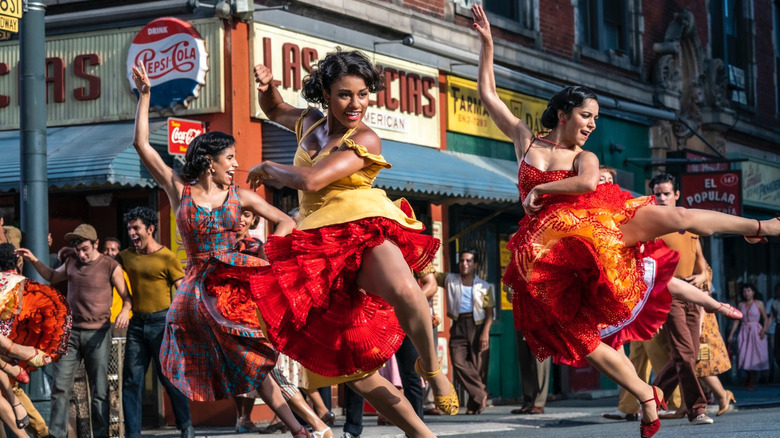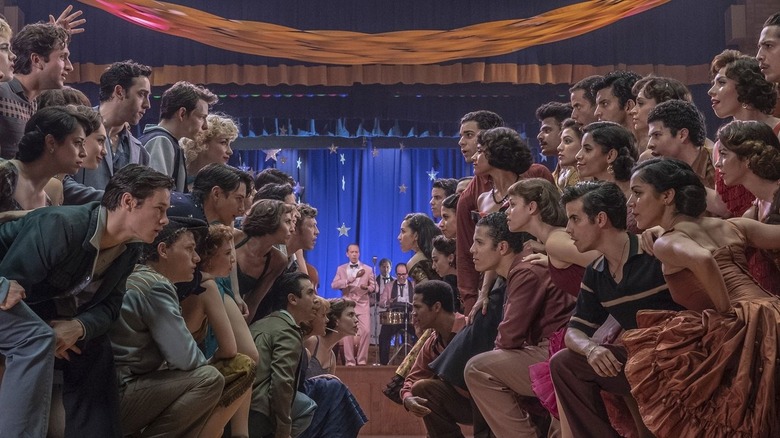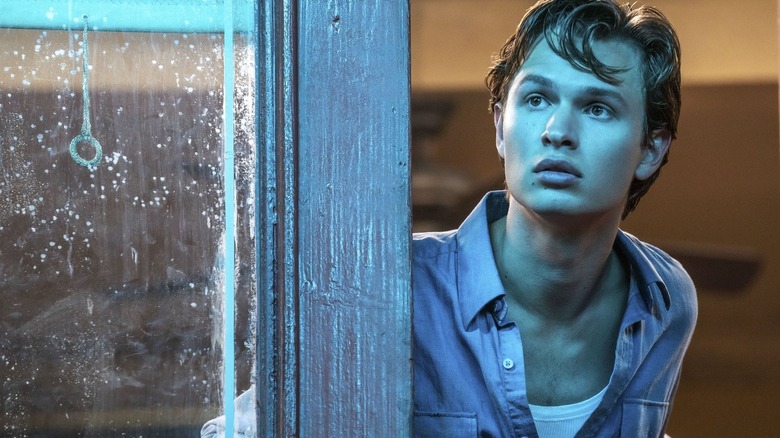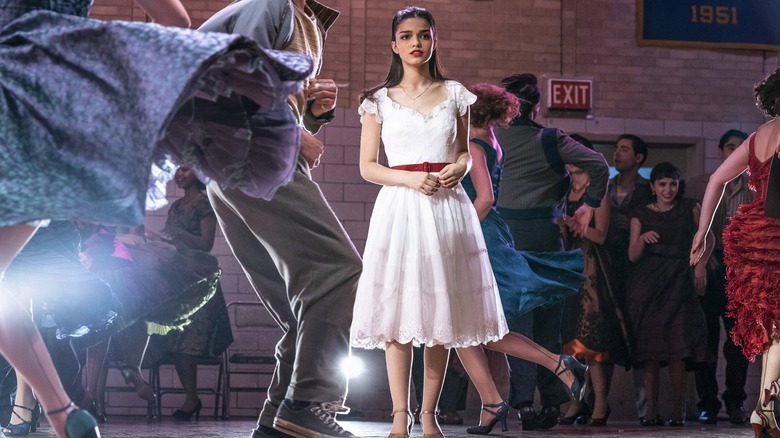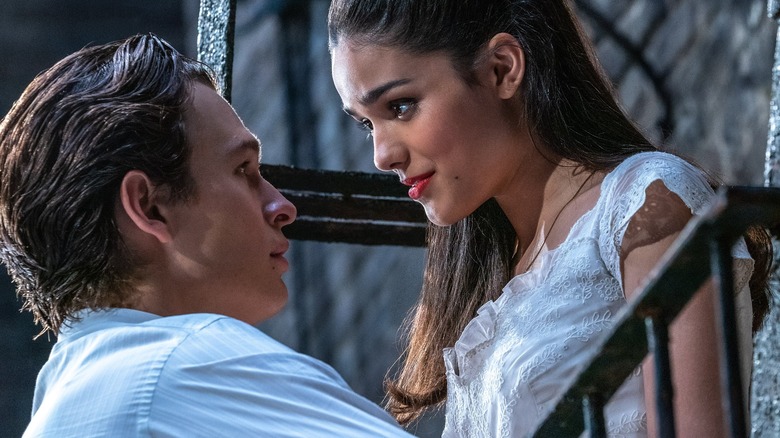West Side Story Review: Steven Spielberg's Big, Vibrant Take On The Classic Musical Is One Of His Best Films
The camera pans across dusty, rubble-strewn ruins, the bent bars of fire escapes littered everywhere, stacked on top of each other like twisted limbs. It looks like a bomb went off here; like we're witnessing the end of the world. And then we see a sign: New York City Housing Authority Slum Clearance. Cranes, and bulldozers, and wrecking balls dot the landscape. One day, this will all be Lincoln Center. For now, it's the turf of the Jets and the Sharks. And that turf is shrinking. No matter — the gangs are ready to go to war; ready to brawl over a series of blocks that won't even exist in a few years. When all is said and done, this slum clearance will displace more than 7,000 lower-class families.
This is how Steven Spielberg's "West Side Story" begins, setting the stage for the filmmaker's vibrant, exuberant reimagining of both the Broadway musical that featured music by Leonard Bernstein, lyrics by Stephen Sondheim, and a book by Arthur Laurents, and of the 1961 film adaptation of the same name. These are big shoes to fill. The '61 film, helmed by Robert Wise and Jerome Robbins, is oft considered the best movie musical of all time, and it would take a crazy amount of hubris to take on such a task. Of course, Spielberg has more than earned that hubris. He's built up an incredible body of work, and he's spent his entire career thinking about making a musical. He inserted stunning musical numbers into films like "1941" and "Indiana Jones and the Temple of Doom," while never fully committing to a movie musical. He's been biding his time, waiting for the right moment. And that moment must be now, because Spielberg's "West Side Story" is a knock-out. A dynamite blend of old-school musical showmanship and modern sensibilities. It's one of the best movies of the year, and one of the best movies of the acclaimed filmmaker's career. Yes, really.
Working once again with screenwriter Tony Kushner, Spielberg has revitalized "West Side Story" to give its cast of characters more depth; more insight; more drama. None of this is to say the 1961 film is old news and should be tossed aside. No, Spielberg's film complements that one, while also forging its own path. At the same time, Spielberg puts pretty much every filmmaker who has made a Hollywood musical in the last 10 to 15 years to shame. To be fair, he is Steven Freakin' Spielberg, so perhaps we shouldn't compare apples to oranges. But gosh, what a joy it is to watch the way Spielberg stages one big, show-stopping musical number after another in wide shots with bursting colors. You can feel the energy from these numbers, and often, Spielberg will leave in shots of the performers out of breath, slightly sweaty from all that action when it's all over. This movie is alive.
Something's Coming, Something Good
Justin Peck's choreography keeps the snap-heavy work of the original front and center while adding new twists, and we're off like a bang as we watch the Jets, a gang of white kids, strut about the streets of their New York neighborhood. Spielberg has these juvenile delinquents emerge from the rubble like denim-clad creatures come up from the earth. They snap, they spin, they fly, they move through a world that seems completely their own, and completely empty. And then — bam! All at once, the scenery changes. Suddenly, the Jets turn a corner and are confronted with a bustling city street populated with people of color. And now the Jets aren't just dancing; they're rampaging, tearing apart the block, deliberately hassling the people they see as outsiders; foreigners encroaching on their land. And when they come across a huge mural of a Puerto Rican flag, they don't hesitate to vandalize it.
Their antagonism is primarily geared towards the Sharks, a gang of Puerto Rican immigrants who had committed the horrible sin of being from somewhere else. The Jets were born here. This is their spot. Of course, that spot won't last. As the harsh cop Lieutenant Schrank (Corey Stoll) says after busting up a brawl between the gangs, sooner or later, everyone in the neighborhood will be evicted. Schrank is clearly racist towards the Sharks, but he's no fan of the Jets, either. He tells them that the white people before them all moved away to bigger, better places, while their loser parents stayed put. "And now here you are," he scoffs. "The last of the Can't-Make-It Caucasians."
The Jets are run by the volatile Riff, played to perfection by Mike Faist as a wiry, smirking street punk. The Sharks are led by the much cooler but just as violent Bernado (David Alvarez, also great), a boxer who says he doesn't want to fight with the Jets, but knows that he must or else risk losing ground. Spielberg introduces us to these warring factions and then breaks them off into their own worlds. Bernardo dwells in a tiny apartment with his girl Anita, played by Ariana DeBose, who is the real standout here, delivering a fun, fierce, star-making performance, and his sister María (Rachel Zegler, an utter delight with a dynamite singing voice). These people don't have much, but they have each other. And here, Spielberg makes an interesting choice to not subtitle the dialogue when these characters speak to each other in Spanish. Even if you don't know the language, Spielberg and his cast work it out in such a way that you can still follow the conversation. It ultimately creates a more intimate feeling for the scenes featuring Spanish-speaking characters.
You Wanna Live In This Lousy World? Play It Cool
As for Riff and the Jets, they seem to be completely cut off. There are no parents in their lives; none that we see, anyway. No family. They merely roam about, looking for trouble. And then there's Tony. Ansel Elgort, the least-charismatic member of the cast, plays the part, and while he's not as lively as everyone else on the screen, he does a good enough job making Tony feel like a real, flawed character. And he has a fine singing voice.
Tony helped create the Jets with Riff, but now he's out. He's on parole after having almost killed someone in a previous rumble, and rather than run around the streets, Tony instead lives and works at a pharmacy owned by Valentina (Rita Moreno, who won an Oscar playing Anita in the 1961 film, and works wonders with her small, delicate part here). Tony is ready to get straight; he's afraid of his inner violence and wants nothing more to do with that life. But Riff can't let Tony go. The Jets are planning one final rumble with the Sharks to determine who controls the neighborhood, and Riff wants Tony to be there. Tony doesn't seem interested, but later he shows up at a dance attended by both the Jets and the Sharks, and that's when everything changes. Across the room, Tony spots María, and she spots him. The way Spielberg frames this meeting is lovely, with Tony and María standing perfectly still on opposite sides of the room while everyone continues to move and flow around them like water.
The chemistry between Elgort and Zegler works. It's cute and has all the naivety of young love. "You're tall!" is the first thing María says to Tony as he towers over her. The two can't keep their eyes off each other, and that's a problem, because Bernardo doesn't want his little sister getting close with a gringo. No matter: Tony is in love. So much so that he takes to the streets singing María's name until he finds her. Spielberg and Kushner wisely play out the courtship between Tony and María a bit rather than making it a love-at-first-sight scenario. The two even go on a date, riding the subway to a museum. All of this is happening over a matter of days, but it never feels rushed. We buy into the blossoming romance. We buy into Tony declaring that he knows he wants to spend the rest of his life with Maria. Even if it seems unlikely and impossible, this is the logic of the beginnings of young love, where everything smells like roses, where you're walking on air, where the sun shines brightest and warmest on your face. What could possibly go wrong?
One Hand, One Heart
As the young lovers are lost in their own blissful world, the turmoil between the Jets and the Sharks continues to build towards the apocalyptic rumble, and Spielberg balances both the light and the dark flawlessly. He also gets to stage big, inventive musical sequences on a grand scale. The streets fill up with dancers, the colors of their clothes bright and popping. Costume designer Paul Tazewell uses shades of sky blue for most of the outfits the Jets wear, while those in the Shark camp favor reds and maroons. Blood red lines the underside of a sunflower-colored dress Anita wears as she sways about, and our eyes are glued to that screen. Spielberg is clearly having fun staging these moments — there's a delightful beat at the start of "America" that has Anita pulling laundry in off of the clotheslines that stretch between apartment buildings. As one brightly colored piece of clothing after another rhythmically moves across the screen it reveals a singing face in an open window. It's the sunny inverse of the great moment in Spielberg's criminally underrated "War Horse" in which the sails of a slowly turning windmill block out an act of violence.
These big numbers will have you wondering why the hell it took Spielberg this long to finally make a musical. It's invigorating that at 74, the filmmaker can still challenge himself and deliver something spectacular to his audience. The real star here isn't the cast, good as they may be. It's Spielberg, who steps into the world of the movie musical and shows modern-day filmmakers how it's done. Every musical from the last two decades that relies on boring, colorless mid-level shots of torsos of actors who barely move looks even more embarrassing and lackluster now. Working with cinematographer Janusz Kamiński, Spielberg creates a landscape that feels simultaneously real and magical. There is a deliberate grittiness at play here: the fights mostly don't involve dancing — they're genuine, complete with pipes and chains and punching fists.
Spielberg also underscores how young and foolish many of these characters are. When Riff buys a gun, he and his friends run out into the street and start play-shooting, with Riff actually pointing a loaded gun at his friends as he yells the word "Pow!" Best of all, Spielberg never feels the need to justify why the characters are singing. At one point in the last two decades, filmmakers got the bright idea that they needed to have some sort of explanation as to why everyone was bursting into song — think of "Chicago," which portrays its musical numbers as fantasies and daydreams rather than events really unfolding. Spielberg knows that old school musicals didn't need such an excuse, and there's not a single moment here where characters dancing and belting out numbers feels awkward or unnatural. It all coalesces, like magic.
Peace and Quiet and Open Air
Then there is the recontextualization of the material. Like the elements involving the slum clearance, complete with a protestor holding up a sign against Robert Moses, the figure who played a major part in New York's urban development in the mid-20th century. Kushner's script wisely doesn't get preachy while still underscoring the racism and classism at play. This isn't a message movie, but the messages still come through loud and clear, and never feel forced or clumsy. The Jets themselves claim they're not racist, that they just don't like outsiders. But it's clear that's just a lame excuse; a way to justify their volatile actions. The film does not excuse those actions, but it does try to explain them, or at least offer insight into the flawed logic of the characters. As for the Sharks, there's a moment late in the film after an act of violence in which they realize that they're fighting each other for such a small piece of land while the world itself is large. There's more to life than a few New York blocks.
And in the background of all the fighting and violence and anger is the sweet, doomed romance between Tony and María, who just want to extract themselves from all this mindless turmoil. They want to pack their bags and hit the road, travel somewhere far away from this place, and find a place for themselves. But since you're no doubt familiar with the fact that "West Side Story" is a reconfiguring of "Romeo and Juliet," you know that such clean getaways are nearly impossible. That darkness is inescapable, and yet "West Side Story" is not overtly bleak or void of hope. The life radiating off the screen in nearly every scene is damn near infectious. You can't help but smile as you watch Spielberg go to work, gathering his players together to sing, to dance, to live, to love, to dream.
/Film Rating: 9.5 out of 10
